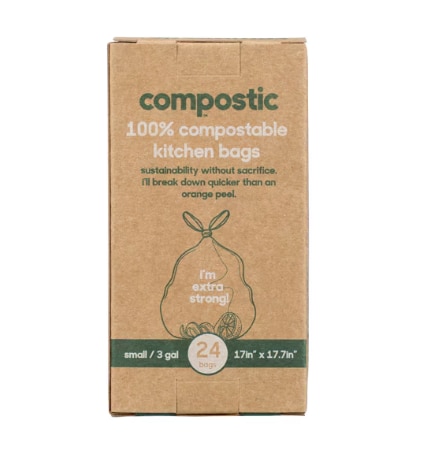Winter often means cranking up the heat and indulging in cozy comforts. But with a little awareness, we can enjoy the season without harming the planet. Here, we’ll explore 15 practical tips for sustainable winter living, from minimizing energy use and reducing waste to making conscious choices in your everyday life.
15 Winter Sustainability Tips
Conscious cooking
Consider your cookware
Eat sustainably with options like ceramic-coated cookware and coated stainless steel. These are healthier, longer-lasting alternatives to chemical-laden (hi, non-stick Teflon) and lead-leaching aluminum pans.
Minimize food waste
The USDA estimates that between 30% and 40% of the food supply in America is wasted each year. Reduce food waste by shopping in more efficient amounts, eating food before it spoils and getting creative with leftovers.
Cut down on meat
Winter offers the perfect opportunity to enjoy hearty plant-based recipes that help lower your carbon footprint. Embracing more plant-based meals can play a role in reducing greenhouse gas emissions linked to animal agriculture. Try making warming soups, stews, and roasted vegetables with seasonal ingredients, and whenever possible consider supporting local farmers along the way.
Black plastic
A new study links that flame retardants can leak out of black plastic utensils, especially when heated. According to eco-cycle, a Boulder, Colorado-based non-profit spearheading zero waste solutions, “black plastics can contain unregulated amounts of toxic chemicals such as phthalates and flame retardants, as well as heavy metals such as cadmium, lead, nickel, chromium, and mercury. That’s because black plastic is largely sourced from electronic scrap such as TVs and computers.”
While the amount of chemicals leached into food are probably minimal, there are still precautions to take. Avoid leaving your plastic utensils in hot pots or pans and throw away black plastic items that are chipped, to mitigate the risk that the peeling plastic will contaminate food.
Holistic home
Simplify the holidays
Holidays, birthdays, weddings and other celebrations are often excessively wasteful. In December, for example, Americans create roughly a quarter more waste than in other months of the year. But it’s not just the extra trash that’s a problem. All the fossil fuels, trees and other natural resources that go into producing gifts, decorations, single-use dinnerware and wrapping paper contribute to the extreme carbon footprint too.
Redefine your celebrations in ways that respect land, waters and wildlife. Instead of celebrating your next holiday with plastic décor, excessive gifts and single-use food and drink containers, elevate the atmosphere with foraged plants, give homemade, secondhand, or at least local gifts, and serve plant-based meals with reusable dinnerware.
Tame your thermostat
For every degree below 68°F, you can save roughly 3 percent on your heating costs. So set the temperature 4° lower if you’ll be away for more than four hours. When leaving the house, turn the heater down significantly to maximize savings. The Department of Energy states that lowering the heat by 10 to 15 degrees for eight hours daily can cut your annual heating bill by up to 15 percent. To help stay cozy, layer up by dressing warmly and use extra blankets to stay warm without relying solely on heating systems.
Think repair not replace
When something breaks, instead of immediately scrolling for a replacement, consider a more planet-friendly approach: try repairing it first. A how-to video on YouTube could be all you need to restore your item to its former glory. And there is something inherently satisfying about fixing something with your own hands.
Seize the sun
Take advantage of daylight to warm up your home naturally with what’s called solar gain. Open curtains and blinds during the day to allow sunlight in, raising indoor temperatures without using electricity. Optimize the use of natural light during daylight hours and limit artificial lighting to reduce energy consumption.
Shovel snow before it turns into ice
Once snow becomes compacted, or when snow partially melts then freezes again, it turns to ice. Not only does ice pose a safety hazard for pedestrians (and pets) but getting rid of ice causes its own set of problems. Case in point: Most commercial de-icing products contain chemicals such as potassium and magnesium chlorides, or calcium salts (that are not safe for pets. These compounds can cause irritation or even chemical burns on your pet’s paw pads, and can also cause gastrointestinal issues if ingested. This is highly probable, given that your pet is likely to lick their paws clean after walking outside. If possible, look for safer, eco-friendly alternatives such as sand and sawdust that apply traction to icy surfaces without using harmful chemicals.
Cut down on cat litter
Conventional cat litter is made from bentonite, an absorbent clay well suited to litter. However, much of the world’s supply comes from strip mines in the Western United States, which can destroy ecosystems, cause erosion and pollute water. From an environmental standpoint, the ideal choice is a plant-based litter made from recycled materials. If composting the used litter safely isn’t an option, opt for a slow-decomposing product, such as wood chips or walnut shells, to help reduce methane emissions in landfills. Note that so called flushable litters compromise our fragile sewage infrastructure.
Wardrobe wizardry
Opt out of dry-cleaning
The chemicals used in traditional dry cleaning, such as trichloroethylene, or TCE, and perchloroethylene, can cause liver, kidney, brain and testicular cancer, and damage kidneys, the liver and the immune system. These toxic, carcinogenic chemicals have huge potential consequences on human health and the environment. If dry-clean you must, seek out eco-friendly or alternative cleaning services when possible to minimize exposure and environmental harm.
Shop secondhand stores
The U.S. is home to over 25,000 resale, consignment, and nonprofit thrift shops, along with numerous online platforms like ThredUp and Poshmark. With such an abundance of secondhand options, always buying new clothes—and contributing to environmental pollution—becomes unnecessary.
Ditch fast fashion
Wean yourself off cheap, trendy clothing produced from low-quality materials. Instead, build a sustainable wardrobe with fewer but well-made, long-lasting and timeless garments.
Hygiene hacks
Make good choices
With so many on clean skincare products now on the market, there’s really no reason not to choose clean, green eco-friendly products. Look for PETA’s pink bunny ears or the Cruelty Free International leaping bunny to verify the product hasn’t been tested on animals and the Fair Trade Certified™ symbol for best manufacturing practices. Verify product ingredients on the Environmental Working Group (EWG) Skin Deep® database or simply choose items with natural, recognizable ingredients and less packaging.
Thoughtful travel
Bring your values on vacation
Traveling responsibly begins with thoughtful planning and informed decision-making. Before your trip, consult guidebooks and online resources to understand your destination’s environmental, social, and political issues. Choose companies with eco-certifications or sustainability labels, and don’t hesitate to ask hotels or tour operators about their environmental and community-support practices—reputable ones will be transparent. If you’re using home-sharing platforms like Airbnb, research the local regulations to ensure you’re supporting legal and ethical options.
Opt for eco-friendly transportation, such as trains or buses, for low-carbon travel, and avoid flying short distances whenever possible. If you must fly, book economy class on direct, non-stop flights, and consider offsetting your carbon emissions to mitigate your impact. Additionally, prioritize flying through “green” airports that implement sustainable practices, such as Boston Logan, Denver International or San Francisco International.
By making good choices, you can reduce your environmental footprint while respecting and supporting local communities.




